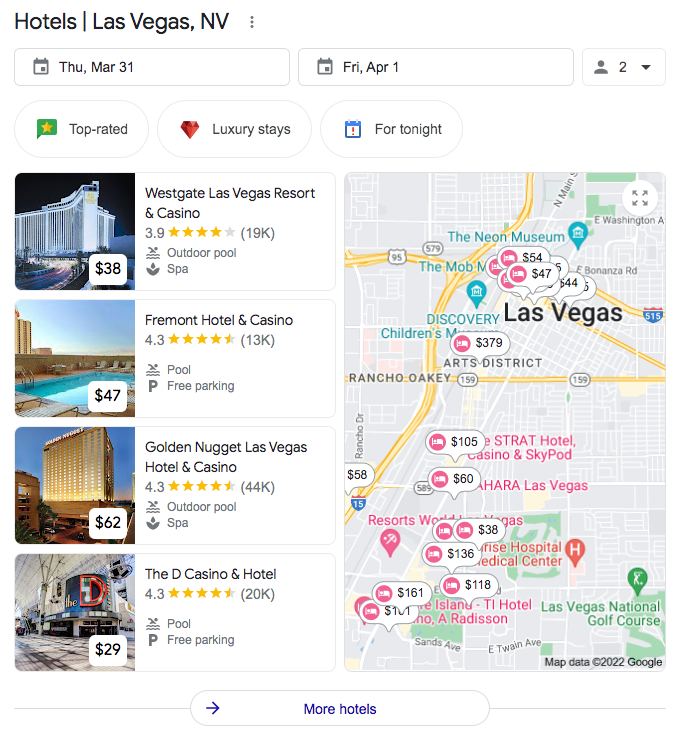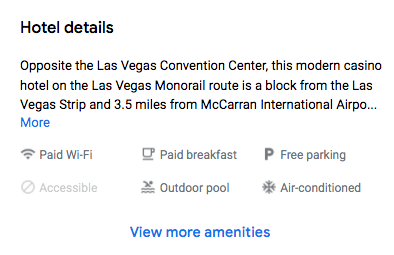Local SEO for Hotels: 12 Tips for Better Local Rankings
by Jeremy Razook
Local SEO for hotels is a crucial component of online success and determines whether someone searching for hotels in your area sees your property on the search engine results page (SERP). This stage in the hotel booking process is incredibly important for hotels, as prospective customers are typically looking for the best option that matches their wants and needs.
Before we move on to the meat of the article, it’s essential to understand how Google’s local ranking algorithm works:
Relevance
How well your business profile matches the searcher’s intent.
Distance
The distance a potential search result is from the location term used in a search.
Prominence
How well known your business is, based on offline world reputation and information that Google has about your business from across the web.
As you read through this article, you’ll soon understand how our advice contributes to these important factors.
It’s also worth mentioning the existence of Google Hotel Packs. These aren’t the typical local packs that you may see for searches like “shoe store near me” or “dog walkers nyc”.

Hotel Packs are driven by Google Travel and are designed to keep customers within Google’s metasearch ecosystem. Hotel Packs typically include pricing details, star ratings, deal callouts, and images of the properties. But they may also include hotel attributes or a snippet of Google-created text that justifies why the hotel is listed in the pack for your search.
With so little space on the SERP for any given keyword, local SEO for hotels can be the difference between your hotel gaining new guests and being buried under a mountain of competitors. Below are 12 things you can do to boost your hotel’s local visibility:
Verify your hotel’s Google Business Profile listing
Verified businesses are more likely to serve in local search results on Google Search and Google Maps than non-verified businesses. If you haven’t verified your business, simply search for your hotel in Google Search. Under the property’s knowledge graph, click the “Own this business?” option. From there, Google will provide options for you to verify the listing. Use our Google My Business for Hotels best practice guide to help you get started.
Once you verify your hotel listing, you can maximize your listing’s visibility by updating the items below.
Enter complete UNAP
UNAP stands for:
- URL
- Name
- Address
- Phone
Simply put, this is some of the most important information you’ll provide Google and is a critical aspect of better rankings in local search results. This information should also be included on your website. Add it to the footer of your website or to a contact us page.
For example, if your address is incorrect on your Google Business Profile and doesn’t match other online directories or what’s listed on your website, chances are you’ll have a difficult time getting your hotel to rank for local searches as it could lead to a negative search experience.
Accurate hours of operation
Again, a no-brainer. Inconsistency across local listings and your hotel’s website lowers confidence in customers and can hurt your local search presence.
Choose the right category
Categories describe your business to Google so that it can show your listing for the right searches and connect your property to the right people. Categories for accommodations include Hotel, Resort, Bed and Breakfast, and so forth. You can select one primary category and multiple secondary categories. The categories you select can affect the local ranking of your business. The primary category should best describe your business, with secondary categories supporting the primary category.
Complete your listing’s attributes
Attributes tell customers more about your hotel and can help separate your property from the competition. Choose from Google’s available attributes that best highlight the aspects of your hotel.

There’s a lengthy list of attributes that you can choose from. If your hotel is pet friendly, offers free Wi-Fi, and has a swimming pool, there’s an option for each of those. The attributes you select will display in your hotel’s knowledge graph in Google Search, Google Maps, and Google Travel. Google also says attributes rely on input from customers that visit your hotel, so it’s a good idea to audit your listing from time to time to make sure your information is correct.
Hotels can also add health and safety protocols and eco-friendly practices to their listing, including an eco-certification badge that displays on Google Travel. A hotel must be eco-certified by one of the following organizations in order to add an eco-certification badge to its listing.
Manage and respond to reviews
Google knows people like to read reviews before making a decision for any particular product. So it’s not surprising that reviews factor into Google’s local ranking algorithm.
Whether they’re good or bad, respond to reviews on your listing. Not only does this help bolster your listing’s visibility in local searches, but it reflects positively on customers who see your listing in the local search results by demonstrating that you value your guests.
No cookie-cutter responses. Tailor your response to each individual review. Also, don’t stuff your responses with keywords, and don’t directly ask reviewers to leave keywords in their reviews. It comes off as disingenuous.
While Google doesn’t say directly that including keywords in reviews improves local rankings, studies have shown that local SEOs believe that placing keywords in reviews can positively impact rankings.
Let’s say you’re a family-friendly property with an on-site waterpark. In a post-stay email to a family that stayed at your property, you could ask “How did you enjoy the on-site waterpark?”. This prompts the guest to focus on that specific amenity and could lead them to include the term “waterpark” in their review without you directly asking them to do so. In turn, Google sees your hotel is relevant for that topic and may be more inclined to show your property for similar searches.
Upload high-quality images and/or videos
High-quality images and videos of rooms and amenities help differentiate your hotel from the competition. You should use interior and exterior media assets that highlight the features your hotel has to offer. You’ll also have the option to categorize your photos. Categories include Rooms, Food & Drink, Interior, and Exterior. This makes it easier for customers to sort through your images.
It’s important to note that anyone can add photos to your listing. It’s always a good idea to audit the photos in your listing from time to time and flag any photos that misrepresent your property.
Audit your remaining online directories and citations
Your URL, name, address, and phone number should match across all online directories and citations. This includes spaces like Bing Places, Hotfrog, Yelp, Apple Maps, and Foursquare.
In fact, Google also uses publicly available information that lives across the web to compile information for your Google Business Profile. To be on the safe side, it’s best to make sure these spaces display accurate information.
Moz Local is a great tool for monitoring and syncing data across multiple online directories with just a click of a button. If you plan to take on local citations manually, BrightLocal provides a handy list of popular citation sites for hotels that are typically used by travelers. Get more information, tips, and how-tos with our Google My Business for Hotels guide.
Solicit Reviews for Google Business Profile
We mentioned earlier how important it is to respond to reviews on your Google Business Profile listing. Google states that “high-quality, positive reviews from your customers can improve your business visibility”.
If you’re asking yourself, “How do I get more reviews for my hotel’s Google My Business listing?” we recommend incorporating the following methods into your hotel’s marketing strategy and daily operations:
- Have front desk staff remind guests during the check-out process
- Send an automated check-out and/or post-stay email with a shareable review link
- Push notification through your hotel’s mobile app at check-out
- Signage throughout the hotel and in the hotel rooms
- Paid social campaign that targets recent guests
- Include a link on your website to leave a review
While asking for reviews on your Google Business Profile is very important, Google does source reviews from other websites and may include those reviews in your profile. So it’s still worth requesting reviews on third-party websites.
Optimize your website for long-tail local keywords
Google says that a website’s position in the organic search results is in fact a local ranking factor. So it’s important that you optimize your website’s content to match local searches. However, it’s incredibly difficult for independent hotel websites to rank for broad search terms like “hotel + location” (think along the lines of “hotels in las vegas” or “new york hotels”.) That’s why hotels should optimize for long-tail search queries.
Search queries like “hotels for + traveler”, “hotels with + amenity”, and “hotels near + attraction/landmark” (e.g. “hotels in las vegas for families”, “charleston hotels with indoor pools”) typically offer a much better opportunity for independent hotel websites to rank in the search results and catch customers that know the type of hotel they want to stay at in your area.
This also doesn’t have to be specific to just property-specific keywords. This is a chance for your hotel website to become a source of information for your guests and anyone traveling to your area that may be looking for more information.
Of course, you’ll need to do your own research to identify the right keywords to rank for. We recommend using the Keyword Research for Hotels guide to get started. Once you’ve found the local keywords you want to target, incorporate them into the appropriate web pages and/or create kick-ass hotel content that will help grow your hotel’s local search presence.
Improve your Schema markup
Schema helps Google understand what a page and/or website is about. And because Google collects information from sources from around the web to help complete your listing, it’s best to make corrections to the schema that currently exists on your hotel’s website and/or add new markup that aligns with your hotel’s offerings.
You can use category-specific schema, like Hotel or Resort, to list information about your property, including amenities, social links, check-in and check-out times, website, address, and phone number.
Build local backlinks
Backlinks from local businesses can act as an endorsement to Google that your hotel is a prominent business in your area, which has a positive effect on local rankings. If your hotel partners with local businesses, it doesn’t hurt to ask those businesses to add your hotel’s website link to their website.
You should also check local business directories like your tourism bureau or chamber of commerce to make sure your hotel’s website is receiving backlinks from these sites, too.
Even building backlinks from travel blogs or travel websites that feature your area can send signals to Google that your hotel is a prominent local business. For more link-building tips, check out our guide to link-building for hotels.